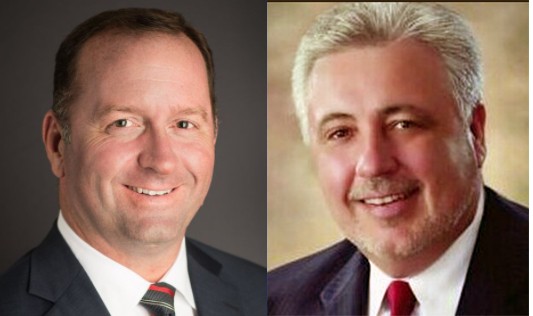
L to R: David Lenoir, Terry Roland
The forthcoming 2018 duel between Shelby County Commissioner Terry Roland and County Trustee David Lenoir for the Republican nomination for County Mayor has become a major factor in the Commission’s proceedings, and it figured notably as the county’s legislative body moved this past week toward approval of a budget and tax rate for fiscal 2017-18.
The latest set-to occurred on Wednesday, as a quorum of 10 of the 13 Commission members met in a special called meeting for the final required reading on the $4.11 tax rate that was voted with near unanimity on Monday (12 to 1, with only one Commissioner, Democrat Walter Bailey voting Nay).
The Wednesday meeting turned out to be not quite as pro forma as expected, however. Between Monday and Wednesday, Lenoir let it be known through several means —including at least one speech, a news interview, and a pair of Facebook posts — that he disbelieved in the $4.11 tax rate as being the actual tax cut that the Commission thought it was in adopting it.
Lenoir cited numbers purporting to show that representative homeowners, especially in suburban Shelby County, would actually be liable for higher out-of-pocket property taxes in the coming year, as a result of a recent county reappraisal significantly raising property values in the county.
The Trustee was an attendee at Wednesday’s meeting, and, though he did not speak directly to the Commission during the meeting, he had with him figures that he cited to reporters afterward appearing to show that taxes would be higher on the average in three suburban communities — Bartlett (up by an average of $100), Germantown (up $150), and Collierville(up $200). “And that’s residential property. Commercial property is up even more,” he said.
The issue had been bruited about by Commissioners at Wednesday’s meeting before they ultimately confirmed the $4.11 tax rate with a unanimous vote of 10 to 0.
Unsurprisingly, the response to Lenoir’s criticism was led by Roland, who maintained that the county administration, with direct concurrence and participation on Trustee Lenoir’s part, had,on the front end of tax-rate discussions, certified $4.13 as a figure that would maintain stable revenues in accordance with a new countywide property aapparisal that had, on the average, substantially raised real property values.
Inasmuch as state law prohibits “windfall” revenues resulting from such adjustments of a county tax rate to revised assessment values, Roland’s argument went, any overage of the sort claimed by Lenoir clashed with the Trustee’s own prior participation in certifying the $4.13 rate.
In any case, argued Roland, Heidi Shafer, and others, the lower tax rate of $4.11, which was adopted by the Commission on the premise that it gave county taxpayers a two-cent real tax decrease, would by definition make windfall revenues even more unlikely. And the defenders of the $4.11 rate, while acknowledging that some property-owners in the suburbs might end up paying more taxes as a result of dramatically higher assessments, the majority of county property-owners would be taxed at a lesser amount.
Lenoir’s contention is that the balance is in the other direction — i.e., that a majority of the county’s homeowners would end up paying more taxes while a minority would gain some measure measure of tax relief from the $4.11 rate. The Trustee noted to reporters that the lower rate had been achieved via a compromise this week between Democrats and Republicans that saw an additional 1 percent pay raise for county employees, added to what had already been a 2 percent raise in the provisional budget.
“It’s all baked in together,” the Trustee said, in defense of his contention that, on the whole, the final compromise package would, on balance, raise tax rates.
Though Roland et al. won this battle, it seems clear that Lenoir is counting on reversing the outcome during his forthcoming mayoral contest, when each candidate will claim to have acted more responsibly in the taxpayers’ interest and each will be able to cite numbers justifying his position.
This week’s verbal sparring followed a previous round back in the spring, before budget discussions began in earnest, when Lenoir claimed that he had advocated specific tax reductions in previous fiscal years had been ignored by the Commission — a contention rejected by Roland, who said no such proposal had been presented to the Commission, much less ignored.
Tensions between the two had flared up also early in last week’s 7 ½-hour marathon budget session of the Commission, when Roland had proposed transferring $50,000 from the Trustee’s proposed budget allocation to help pay for a needed employee in the General Sessions Drug Court of Judge Tim Dwyer.
Roland based his proposal on a contention that Lang Wiseman, a de facto legal counsel on Lenoir’s staff, was being paid despite “not showing up for work.” Lenoir appeared before the Commission to reject the claim and accused Roland of playing politics. In the end, the $50,000 needed by Drug court was approved through other channels, and Roland, satisfied, withdrew his proposal without a vote being taken.